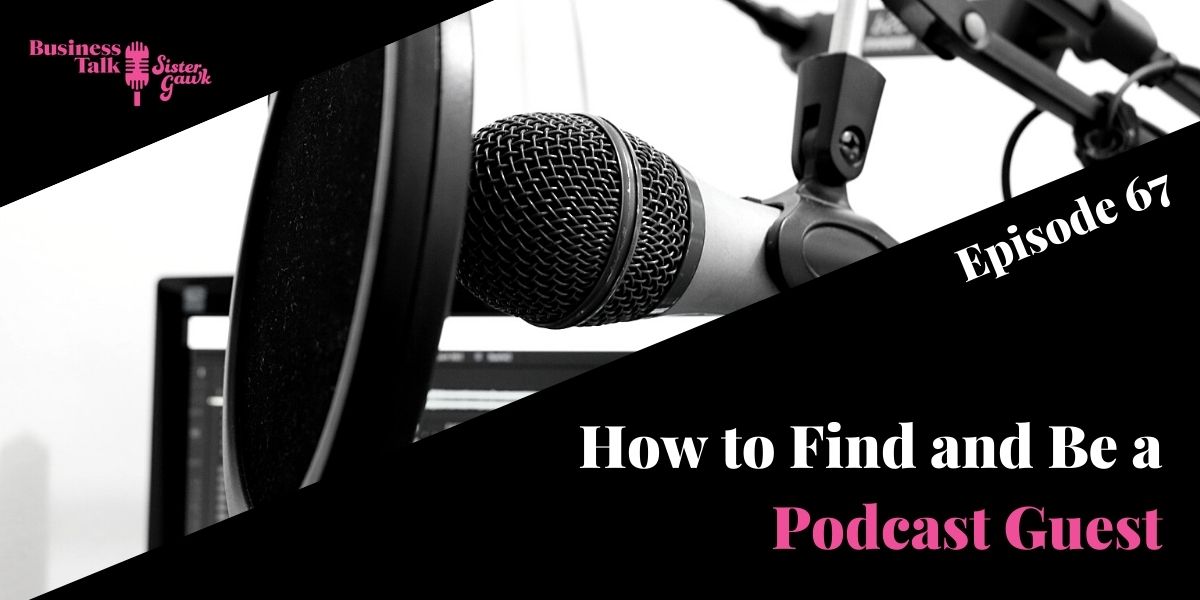Since we’ve been a guest a few times, and have had many guests on our podcast have we learned quite a bit about this topic! This week, we’re going to talk about the different ways you can find a guest or look to be a guest on a podcast. You’re going to hear about all the different lessons and processes we’ve learned to make it easier!
Welcome to Business Talk Sister Gawk I’m Bekkah! And I’m Ruthie and today’s episode title is “How to Find and Be a Podcast Guest”. We’ve been doing a little podcasting for a while. We just did our annual review of podcasts –
Ruthie: *Celebratory sound* *Dun-da-da-duh!!*
To Get on Podcasts Use Podcast Matching Platforms
Bekkah: And then we decided, oh, we have so much content that we actually should be making another episode, too. Because there are a lot of things that we’ve learned about being a podcast guest and finding podcasts or like people who have wanted to be our guests as well. The first thing that we wanted to talk about is – there are a couple different podcast connection platforms. Originally, when we first started we were asking people that we knew and we still do that because that is really – we find some really quality interviews that way through either a friend of a friend that is doing something really interesting. There are a couple of different ones that I have looked at before. Podmatch is one of them.
Ruthie: Another one that’s out there is audry.io.
Utilize Facebook Groups for Podcasts
Bekkah: Yeah, and I actually haven’t dabbled a lot with this one, but then there are podcast Facebook groups where you can find a guest or be a guest. Those, in the past, have been good if you are looking for very specific things. There are a lot of people that are more than willing to be on your podcast in those kind of groups because that’s what they’re there to do. But you also have to be very specific about what you’re looking for in a guest or it’s overwhelming how many people will comment on it. Then the other negative thing you just have to be aware of with Facebook groups is that if you’re in a really active group and you comment on something and you’re like, “Yeah! This sounds really interesting to me!” or whatever. You’re like looking to be a guest, they can comment back or they’ll say, “Okay, I’ll DM you or like direct message,” then sometimes it can take people a little bit to get around to it. Commonly what I’ve seen is about the time that they finally get back to you, you can’t find the original thread that you were talking to that person on and you can’t remember the context of the conversation because it was just comments on an original post.
Ruthie: That’s like if the group is so busy that it’s just posting and posting and posting and then all that whole conversation is pushed way down in the feed that you can’t even find it anymore.
Bekkah: Yeah, so originally when I was in a very first Facebook group that was getting started it was only like a couple hundred people and it was pretty manageable, but I would say groups that get over like 300 people start just getting out of control in that way and then it’s like, “Oh, okay, like there’s too many people talking!” I really do think it depends on the group, in general, too, because you can learn a lot of great things from other people in big groups.
Ruthie: How would you optimize using Facebook groups for finding people to interview or people to be on their podcast?
Bekkah: Yeah so if you’re gonna – know what kind of content you want to produce and say specifically “this is the type of person I’m looking for.” Then, also, if you’re going to be a guest and you want to introduce yourself in a Facebook group you say, “Here are the things that I can talk about.” Podmatch actually does a really good job of walking you through that if you want to be a guest. You can say, “These are the things that I can talk about any day of the week.” Like these five topics or whatever. Then what’s nice about Podmatch is that it will do algorithm matching of you with podcast hosts. The downside of pond match is that they want you to do all of your stuff within the platform. Which is good if you’re not an organized person, but if you already have your own processes then that can take up a lot of time to double that information. Especially, if you’re like scheduling it on your own calendar and then scheduling it in there and all that kind of stuff.
How Do You Get on Someone’s Podcast?
Ruthie: How do you ask to be on somebody’s podcast?
Bekkah: Yeah, there are different ways that people do that, right? You can have an intro email if you’re doing research on podcasts you have to find ones that are within your target market.
Ruthie: Yeah, it doesn’t really make sense for you to – if you are doing makeup it doesn’t make sense for you to be on a podcast about cars. You have to kind of align with your audience what your audience is going to listen to because if you’re trying to build exposure it doesn’t make sense to build exposure in a market that you’re not trying to reach anyway.
Bekkah: Yeah, but also to really identify how you can bring value to those listeners and have that clearly defined. Sometimes we get requests from people to be on our podcast and it’s like so much information about “we’ve been on this podcast, this podcast, this podcast” and I’m like, “I don’t really care where else -”
Ruthie: What did you do?
How to Be a Good Podcast Guest
Bekkah: Yeah, and I mean like it’s great that you’ve been doing all this work and getting on all these podcasts but what is it that really will be valuable to my listeners? Then on top of that I’m just gonna say that the majority of people who request to be on our podcast, they’re actually doing it through someone else. They have a team of people and one person on their team is specifically working on making these requests. There are actually companies out there, in the past, when podcasting wasn’t a huge thing or talk show house, in general, you would pay a marketing company or like a booking company to go get you all these interviews and exposure. They got paid based on how many interviews that guest had. That’s a lot of how the radio industry works.
A lot of people will say, “Hey! I have a guest. This is the book they’re putting out. This is what they want to do. Blah blah blah.” And then they’ll book you if they find it interesting. They’re taking that same approach that they use a radio and then they’re doing it for podcasts. I don’t necessarily think that that’s bad, but what I’ve found when we’ve looked at different people who are requesting to be on our podcast is that they have one pitch that they use for everybody. They don’t take the time to know about us or why they think it’s a good fit. Because they’re just mass producing this stuff. This means that you could really, unfortunately, get a guest that says the exact same thing that they just said on everybody else’s podcast and it’s not unique content. It’s not really bringing value to anybody.
Ruthie: That’s why we try really hard to create custom questions to send them so that we’re asking them things that maybe they haven’t talked about before and you can kind of hear it every now and then like when you strike a chord if they’re like, “Oh!” Now they can transition into their pitch that they’ve given 10,000 times and they just go and it’s like, “Oh, okay! Here we go!”
Bekkah: Yeah, and I think one thing that we’ve found. I mean obviously, a lot of people want to be on a podcast because they’re trying to get their name out there. That’s not a bad thing! But! How you go about that has all of the meaning of tact in the world. One thing that we’ve found as hosts is that it’s more fun for us to actually get to know the person, interview them ourselves, or like talk with them and find out all the different things about them so that we can pick out – this is what we think is actually going to be valuable to our listeners. Then we actually talk about why we think that’s valuable. Like, “Wow! This is what you’re doing and this is what we really appreciate about it!” So that they don’t have to sell themselves, because anytime anyone sells themselves, it’s incredibly awkward. Oh my word.
Consider Having a Co-Guest Buddy
Ruthie: It’s way easier to talk up somebody else than to talk up yourself.
Bekkah: Yeah, and you want to know something? That is totally an advantage that Ruthie and I have when we’re interviewed on other people’s podcasts and I’m not great about talking up myself in those ways. I’ll just be like, “Oh, you know I have a business,” and Ruthie is like, “Okay, we’re backing up the train! That is amazing and here’s why!” And I’m like, “Oh, I was not expecting you to do that! But thank you, because I’m not good about telling people that aspect.”
Get Creative in Asking People You Think Are Cool to Be on Your Podcast
Ruthie: And one thing that’s really fun about podcasting is that it’s pretty low risk for the people that you’re interviewing. It’s not like they have to look really good or they have to smell good if they’re gonna be in person! They just kind of show up and you can record them from wherever but what I’ve seen like – if I watch a webinar on something or if I take a LinkedIn course or something like that what’s been cool for me and I’ve been starting to kind of as I’ve been building confidence in what we’re doing I’ve started to reach out to those people.
We’re gonna be interviewing some of them in the future which I’m so excited about because I just reached out to them filled out their contact form on their site and then just said, “Hey! I heard you speak at this webinar can we interview you on our podcast?” and gave just a little spiel or whatever but that’s for me what has been really fun is because it’s not just going to the platforms like audry.io, Podmatch, and Facebook groups – they’re really valuable but what’s fun for me is being able to find someone who I think is really cool, reach out to them, and say, “Hey! can we interview you?” because it’s a pretty low risk the more often than not we’ve gotten people that said, “Yeah!” but I will say be prepared to be ghosted. Like somebody reaches out, you’re gonna do it, then they don’t follow up or whatever. We’ve had quite a few of those where like we set up something and then they just don’t show up to the meeting and then we follow up. Then Bekkah and I – usually our go-to was like, *very somber* “Wow! They probably died!”
Bekkah: Like, “Wow! I hope they’re okay!”
Ruthie: Yeah, which I think is maybe a morbid mentality, but I feel like it’s actually good because we’re not basing our worth in being able to get interviews. We’re just like, “Oh! Okay, it didn’t work out. Oh, man! What if they died!”
Bekkah: “We should really be understanding to whatever’s going on in their life right now!”
Ruthie: And a logistical thing too when you are scheduling out – is ‘logistical’ a word?
Bekkah: Mm-hmm!
Don’t Schedule Podcasts Too Far in Advance, People Forget!
Ruthie: Okay, good. *both laugh* Logistically, when you’re scheduling out with people if you schedule out too far in advance people will forget or if you have a huge backlog you either need to be really open and honest about that and say, “Hey! we’re recording this but we have like – we’re booked out two months in advance before this is really gonna go live,” you need to like –
Bekkah: Prep them for it.
Ruthie: Prep them for that so that they don’t think it’s gonna come out right away, but we found that when we book them really far in advance then people, more often than not, forget about it. So if you can get it within the next two weeks or so of reaching out to someone if you can schedule it in the next two weeks then that is kind of the ideal time frame that we found.
Bekkah: Or send a follow-up email like reminder this is coming up!
Ruthie: And going back to the low-risk thing when you think about – Bekkah always is really into data which is awesome, 10% of podcasts are recorded live so the vast majority of them, 90% of them are pre-recorded. If you go into that when you’re requesting interviews with other people and just tell them like we talked about this in a couple of episodes ago and just tell them, “Hey! if you say something that you didn’t want to say just pause and we’ll edit it out!” When you reach out to people making sure that they’re aware, “Hey! It’s not that big of a deal if you don’t have to be nervous about this.”
If You Research Your Podcast Guest Well, The Interview Will Go Way Better
Bekkah: Yeah and I also think it’s really important to do your due diligence on your guest because if you don’t do that it’s so abrupt and we’ve actually heard this from quite a few different guests where they’re like, “Wow! This is the most thorough interview. I’ve ever had!”
Ruthie: And that’s in regards to people that have done a ton of interviews, but one thing that – And those are valuable interviews! I’ve enjoyed getting to know those people and learning about their lives, but some of my favorite ones that we’ve done have been with people who do not get interviewed a lot. It’s like finding this gold mine of knowledge that people just – they don’t ask them! And so you get to talk with them and it’s not scripted but you’re asking experts on things and they can just be like, “Oh, yeah!” and just tell you even though nobody’s ever asked them before. It’s so fun to get those responses that are not canned from someone who’s done 20 interviews in a week. Those are my favorites.
What Demographic Is Looking to Be on a Podcast?
Bekkah: Yeah and I would say the majority of people that are on Facebook groups, podcasts, and platforms for connections, they’re really big business-minded or they’re pushing to grow their business and they’re doing these things because they know a lot about marketing. The people that I find are hidden gems that we’re just like, “Oh, this is good!” are people that are referrals or whatever and we’re like, “Wow! You’re doing something amazing! Let’s talk about it!” And like they do a lot of work to get their content ready because they’re so excited to be interviewed and I love those people because they’re not just doing it to make money. They’re doing it because they’re like, “You want to know something about what I do and you see value in it? Okay, I’ll tell you all about it!”
Ruthie: And they just want to share their knowledge and that’s fun! Now we’re going to talk about what it takes to be a good guest for somebody else.
Always Have a One Call to Action for Your Podcast Listeners
Bekkah: Yeah, it’s really important and we’ve learned this the hard way to have what you’re going to talk about and what you have as your end goal for the listener. Because otherwise it’s you just hanging out and rambling and you’re not getting any call to action like at the end “this is what I really want people to get out of this.” Either it’s like, “I want you to go check out this Youtube channel and listen to more stuff on this if you really found this valuable content” or “go listen to my podcast” or “go find this book!” Whatever it is provide, value in a way for them to connect with you further or it could just be, “Hey! If you enjoyed this follow me on Facebook or Instagram,” or whatever that platform is that you’re using.
Ruthie: Yeah, and on that note! Follow us on Facebook!
Bekkah: Business Talk Sister Gawk!
Practice Being Interviewed on Other Podcasts and Interviewing Others
Ruthie: Yeah, also I was thinking about how one thing that’s been really valuable is when you’ve been interviewed you learn how to be a better interviewer. It also kind of just develops a level of compassion too because as you are being interviewed you’re responding to someone else’s prompts. Whereas when you’re interviewing someone like when Bekkah and I interview people we’ve got our Zoom chats up and then we just send “ask this next question” to each other and so we know what we’re going to ask the person next but they don’t know. I mean they have the – we send the questions to them beforehand so they know that we’re going to ask those questions but they don’t know what order we’re going to jump around in or if we have subsequent questions that we’re going to ask. So it can kind of feel, when you’re on the receiving end of those questions it’s really good to develop that compassion of like, “Wow! This really is kind of unnerving! Oh! I have to respond right now!”
Bekkah: Yeah, when we were interviewed a couple of different times like the first time Ruthie and I did an interview together we also realized, “Wow! People get confused because our voices sound the same.”
Ruthie: Yeah, *laughs at the confusion*
Bekkah: Then that was like should we be like saying “and this is Bekkah talking” like or whatever. Those are things that we learned about doing a two-person interview but also when you’re looking at places to be interviewed by you need to figure out those value points. Like I said, “This is what I can talk about.” Do your research on those things. If you listen to people’s podcasts and then you go check out their websites or whatever and they have a contact us form that’s how some people connect with us. They send us an email and we’re not the greatest at looking at all of those in a timely manner, *throws shade at Ruthie because she’s supposed to manage that inbox* but that is how some people have reached out to us.
Ruthie: Filling out our contact form, yeah.
Bekkah: Yeah filling out a contact form can be a place to do that. I also think it’s really important to listen to someone’s podcast and know what they do.
Ruthie: At the very least, read their about us page.
Do Your Homework on The Podcast You Want to Be On
Bekkah: Yeah, before you send them an email because you need to know exactly this is the type of content they produce. I listened to these episodes and I think I can offer you this episode. Because there have been so many times where people have been like, “I want to be on your podcast!” and then we’re like, “Have you even listened to our podcast?” and they’re like, “No!” so they have no idea that we do something silly at the end and I’m like, “Okay, so we do something funny. Do you have anything embarrassing you want to share?” And they’re like, “Wwwwhat?”
Ruthie: A lot of these podcasters are really busy. You have to be able to get them the first time by providing a really valuable phone call or email or whatever showing that you’ve done your research.
Consider Sending an Audio Clip or Other Example Podcasts You’ve Been On
Bekkah: Yeah another thing that I think is really important is having some sort of voice recording that you’re sending too, if you’re gonna say, “I would love to be on your podcast,” because here’s the thing I have regretted I mean not in this podcast but like in the past when I’ve been thinking about going on someone’s podcast or something I’ve regretted not listening to their voice first and being like, “Is this someone that actually has good cadence?” Because that can be something that is really hard to navigate in editing or whatever else afterwards. I think about that when we’re going to interview somebody.
Bring Value and Sales Will Come Not Vise Versa!
Ruthie: Yeah and also – going back to value that you can add you don’t have to be uber salesy. We’ve all listened to podcasts where the whole thing is like, “Okay can you just get to something valuable? I’m so tired of listening to you sell yourself!”
Bekkah: “I’m amazing!” the whole time!
Ruthie: If you have valuable content to say that is your sales pitch. If you can be so knowledgeable about something and say something that really is profound or have really good information that is your sales pitch. If you can like definitely have your call to action if you want somebody to check out your website say that *chuckles so self like a nerd* businesstalksistergawk.com – any way you don’t have to sit there and like your whole pitch is just you constantly –
Bekkah: Oozing sales!
Ruthie: Yeah like, “Oh, check out this course that I made!” or “check out this printable item that I have” or whatever that can be really aggressive it’s like, “Okay, well, why can’t you just tell me what’s in that?” You can definitely have those resources available to people, I’m not saying that but don’t make that the focal point of your message in your recording.
Utilize Stories in Your Podcast to Help People Remember
Bekkah: Yeah, I definitely think it does help to also have some good stories of something in your back pocket to share. Anytime we talk about something stories really help people maintain information. If you can say, “In this specific example, this is what happened and here’s how this made a difference -” whatever it is if it was like a life experience or whatever you’re gonna help people understand, “Oh, this is what I need to take away from this conversation.”
Ruthie: Okay, and do you want to know where you can find valuable content? Our Facebook page!
Bekkah: Yeah whenever we find free stuff or whatever we’ll just like throw it on there so yeah you should follow that because that’s where you can find updates when we have a new episode coming out too.
Ruthie: I don’t even feel hypocritical saying that I feel very good about it because I know that it’s valuable information and I know that our podcast does have valuable information for our listeners so you’re welcome for that.
Bekkah: And all of it’s free. Come on people.




